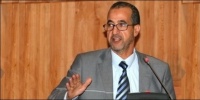Home » Morocco » Press Releases » MOR - News » Morocco: Magistrate at the Court of Cassation Mohamed Anbar's Case Referred to the UN
Since the promulgation of the 1st of July 2011 Constitution, which grants the right of judges to form associations, Anbar has played an important role in the creation, in 2011, of the Morocco's Magistrates Club, an independent association of which he was elected Vice-President and which works to strengthen the independence of the judiciary in the country.
In this context, Anbar has strongly criticised several bills, including that on the Statute of Magistrates, which prohibits magistrates from going on strike in the name of the "duty of reserve", imposed on them by the Constitution. Believing that this provision is inconsistent with the right to strike guaranteed by Article 29 of the Constitution, he organised a peaceful sit-in outside the Ministry of Justice, which provoked tension between Anbar and the authorities.
In retaliation, he was then transferred to the office of the King's Public Prosecutor at the Court of First Instance in Bejaâd, a small town about 200 kilometres south of Rabat. Considering it a measure of punishment, he refused to accept this transfer. He was then reassigned to the office of the Court of Cassation of Rabat as the King's Vice-Prosecutor, a reassignment that he also refused, as he viewed it as an unjustified demotion.
Convening irregularly with the Supreme Judicial Council because of these disciplinary transfers, Anbar also refused to appear before the council because of the breach committed against him in respect to the notification procedure, which must remain confidential in order to protect the reputation of the magistrate.
Arrest and removal from office of Anbar
On 6 May 2014, in his quality of Vice-President of the Magistrates Club, Anbar was invited to the French Embassy for a workshop on the justice reform in Morocco, during which the suspension of judicial cooperation between the two countries was also discussed after a complaint regarding torture by an NGO against the leader of the Moroccan intelligence service was filed in France.
Interviewed by the press at the end of the workshop, the Vice-President of the Magistrates Club spoke about the consequences of the suspension of the judicial cooperation regarding the situation of French prisoners in Morocco as well as on issues related to extradition requests. Following this event, he was then blamed for having violated the duty of reserve of magistrates and again threatened with sanctions.
In August 2014, the Supreme Judicial Council announced that sanctions would be taken against the judge for "professional misconduct", for "having publicly criticised Moroccan politics", without the sanction being officially notified, in which case it would have been possible for him to challenge it legally.
On 10 September 2014, Mohamed Anbar was arrested by the police without a warrant and forcibly taken to the police station of the 6th district in Hay Riad in Rabat, without being given reasons for his arrest. Humiliated for hours, he refused to answer questions by the police chief, invoking his judicial immunity. Late at night he was brought before the King's General Prosecutor, who informed him that he had been removed from office. The Former President of the Chamber at the Court of Cassation of Rabat was released only after 11 hours of custody, during which he had been prevented from all forms of contact with the outside world.
It was only on 30 October 2014 that the Department of Justice officially notified the removal of the judge from the Supreme Judicial Council, after which Anbar publicly reaffirmed the irregular nature of this decision, especially because it is a clear violation of its rights of defence.
Measures taken by Alkarama
Alkarama is concerned about the reprisals which Anbar has been subjected to and the irregularity of his removal from office. In such cases, when a charge is brought against a judge in office, he/she must be able to fully enjoy the right to be heard and to defend him/herself. Anbar clearly did not enjoy these rights. It therefore seems obvious that he has suffered retaliation because of his role as Vice-President of an independent professional organisation and his commitment to greater independence of the judiciary in the country.
Alkarama asked the Special Rapporteur on the independence of judges and lawyers (SR IJL) to request Moroccan authorities to respect their international obligations, and to reinstate Mohamed Anbar and cease all acts of persecution against him.
Alkarama calls on the Moroccan authorities to respect the independence of judges, a principle which cannot be subjected to exceptions in a democratic State.
For more information or an interview, please contact the media team at This email address is being protected from spambots. You need JavaScript enabled to view it. (Dir: +41 22 734 1008)
 Algeria
Algeria Bahrain
Bahrain Djibouti
Djibouti Egypt
Egypt Iraq
Iraq Palestine/Israel
Palestine/Israel Jordan
Jordan Kuwait
Kuwait Lebanon
Lebanon Libya
Libya Mauritania
Mauritania Morocco
Morocco Oman
Oman Qatar
Qatar Saudi Arabia
Saudi Arabia Sudan
Sudan Syria
Syria Tunisia
Tunisia United Arab Emirates
United Arab Emirates Yemen
Yemen Other Countries
Other Countries





